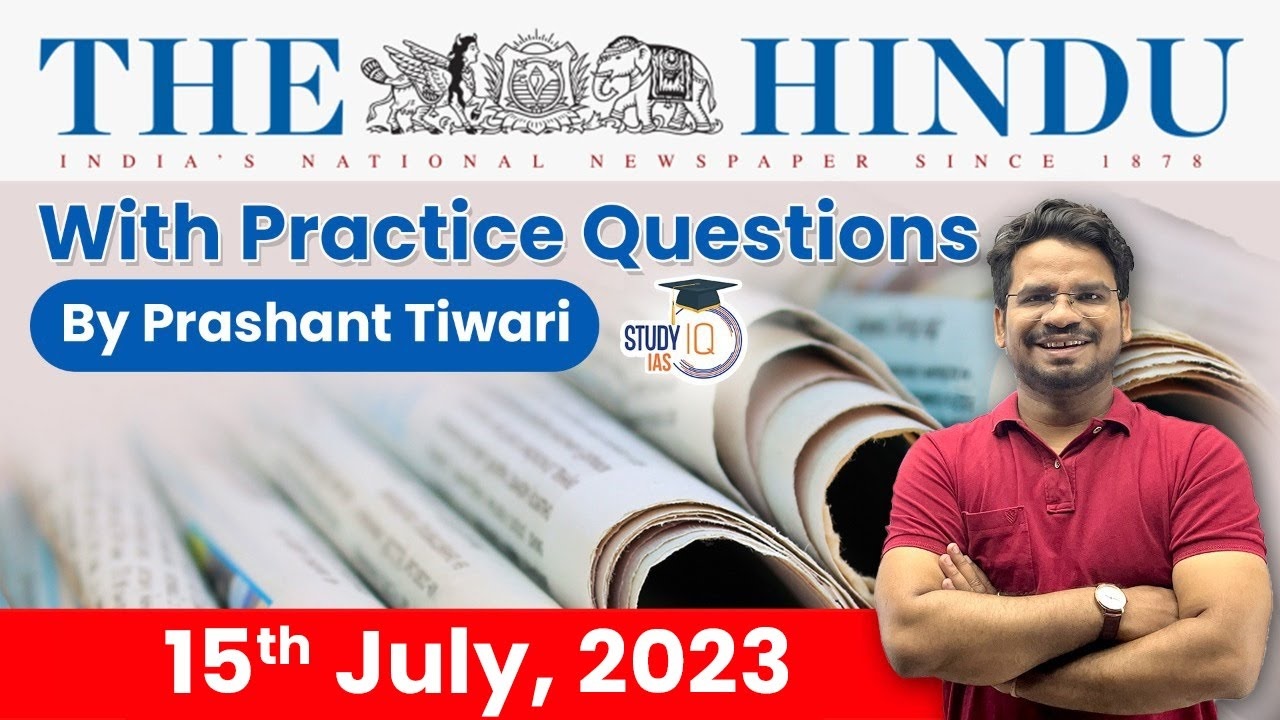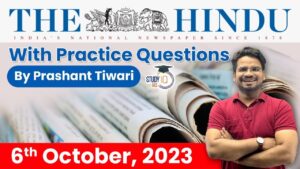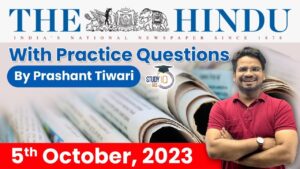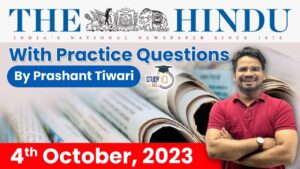The Hindu Newspaper Analysis for UPSC

The Hindu Newspaper Analysis 14 July 2023

- India’s third moon mission, Chandrayaan-3, was successfully launched onboard a Launch Vehicle Mark-3 (LVM-3) rocket from the Satish Dhawan Space Centre in Sriharikota at 2.35 p.m. on Friday.
- This is India’s second attempt at soft-landing robotic instruments on the lunar surface after the previous attempt, Chandrayaan-2, failed in 2019. Thus far, only three countries, the U.S., Russia and China, have successfully soft-landed on the moon.
- Speaking to reporters after the launch, ISRO Chairman S. Somanath said the next 42 days are crucial. “The landing is currently planned on August 23 at 5.47 p.m. IST, if everything goes as per plan,” he said.

- With a human-rated Launch Vehicle Mark (LVM) to be used for the upcoming Gaganyaan mission, the LVM-3’s successful launch of the Chandrayaan-3 on Friday gained significance, as it has further enhanced the reliability of the launch vehicle.
- ISRO’s Gaganyaan project is expected to demonstrate India’s human spaceflight capability by launching three astronauts to an orbit of 400 km for a three-day mission, and then bringing them safely back to earth, landing them in Indian seas.
- ARTICLE 51A(h) of the Constitution of India provides for the development of “scientific temper, humanism and the spirit of inquiry and reform” as a fundamental duty of every citizen. Ours is perhaps the only Constitution in the world which expressly mentions scientific temper.

- China’s actions towards India in 2020 and the evolving international order have obviously compelled a re-appraisal of Indian interests in the SCO.
- This is evident from the point of not only holding a virtual summit but also Mr. Modi’s combative assertiveness on issues of concern to India (terrorism and connectivity) on which it rightly has fundamental differences with China and Pakistan.
- On connectivity, though, which is a core issue for the SCO, India’s isolation in the organisation is apparent. Mr. Modi reiterated India’s position that connectivity projects should respect national sovereignty.
- Certainly, the promotion of Buddhist heritage, however laudable the endeavour, will not help in drawing SCO members towards India and prevent their growing links with China. Besides, the Chabahar project (Iran) has not moved ahead as it needs to.
- Many eyes will now be on the BRICS summit in South Africa in August where Mr. Xi and perhaps Mr. Putin will be present. Will Mr. Modi go to South Africa or prefer to avoid any chance of muddying the waters before his great moment in the diplomatic sun — the G-20 summit in Delhi in September?
- About Shanghai Cooperation Organisation (SCO):
- SCO is an intergovernmental organization founded in Shanghai, China, on 15 June 2001 by the leaders of China, Kazakhstan, Kyrgyzstan, Russia, Tajikistan and Uzbekistan.
- Apart from Uzbekistan, the other five countries have been a part of the ‘Shanghai Five’ constituted in 1996 by China to address border security issues with four of its neighbours.

- The cooperation was renamed SCO after Uzbekistan joined the organization in 2001.
- The SCO currently comprises Nine Member States: China, India, Kazakhstan, Kyrgyzstan, Russia, Pakistan, Tajikistan, Uzbekistan and Iran.
- India and Pakistan became permanent members in 2017.
- The official working languages: Chinese and Russian.

- Monetary Policy Committee (MPC)
- Constituted by RBI under section 45ZB of the Reserve Bank of India (RBI) Act, 1934.
- Chaired by the Governor of RBI.
- Mission: Fixing the benchmark policy interest rate (repo rate) to restrain inflation within the particular target level (2% to 6%).
- MPC conducts meetings at least 4 times a year.
- The monetary policy is published after every meeting with each member explaining his opinions.

- In an interconnected world, a government that seeks greater economic integration and promotes itself as the representative of a nation committed to democratic, liberal and plural values and the rule of law, cannot dismiss scrutiny by like-minded nations with which beneficial ties are sought.
- India’s dismissal of the EU Parliament’s resolution on the violence in Manipur as reflecting a colonial mindset and tantamount to interference in internal affairs, was therefore predictably petulant and in line with similar reactions to scrutiny by lawmakers in the United States, for instance.
- What is European Union?
- The European Union (EU) is a political and economic union of 27 member states located primarily in Europe.
- The EU was established by the Maastricht Treaty, which entered into force on November 1, 1993.
- The main goal of the EU is to promote cooperation and integration among its member states in order to enhance economic and political stability in Europe.
- The EU has its own currency, the Euro, which is used by 19 of the member states. It has a single market where goods, services, and capital can move freely.

- External Affairs Minister S. Jaishankar on Friday discussed “outstanding issues” along the Line of Actual Control (LAC) with top Chinese diplomat Wang Yi along the sidelines of the East Asia Summit (EAS) in Jakarta.
- Friday’s meet was Mr. Jaishankar’s third high-level engagement with the Chinese side in recent months, following bilateral talks during visits by Foreign Minister Qin Gang to India for the G-20 Foreign Ministers’ meet in March and for a Shanghai Cooperation Organisation gathering in May.
- In both meetings with Mr. Qin, Mr. Jaishankar underlined the importance of peace on the LAC as a prerequisite for normalcy in the broader relationship, and called for China to take forward disengagement of troops in the two remaining friction points.
- The East Asia Summit (EAS)
- About:
- The East Asia Summit (EAS) is the Indo-Pacific’s premier forum for strategic dialogue.
- It is the only leader-led forum at which all key Indo-Pacific partners meet to discuss political, security and economic challenges facing the region, and has an important role to play in advancing closer regional cooperation.
- Members:
- The EAS has 18 members – the ten ASEAN countries (Brunei, Cambodia, Indonesia, Laos, Malaysia, Myanmar, the Philippines, Singapore, Thailand, Vietnam) along with Australia, China, India, Japan, New Zealand, the Republic of Korea, Russia and the United States.
- India:
- India is one of the founding members of the East Asia Summit.
- Lead & the Chair position:
- ASEAN leads the forum, and the chair position rotates between ASEAN Member States annually.

- Narendra Modi has become the first Indian Prime Minister to be conferred the Grand Cross of the Legion of Honour, France’s highest civilian and military honour.
- Modi received the honour at the Elysee Palace here on Thursday and joined the ranks of world leaders such as former South African President Nelson Mandela and former German Chancellor Angela Merkel, among others.
- According to the official website, the Legion of Honor is the reward for “outstanding merit acquired in the service of the nation in a civilian or military capacity”.
- “Foreigners may be decorated with the Legion of Honor if they have rendered services (e.g. cultural or economic) to France or supported causes defended by France, such as human rights, freedom of the press, or humanitarian action. State visits are also an occasion for conferring the Legion of Honor upon official figures, pursuant to diplomatic reciprocity and thereby supporting the foreign policy of France,” as per the award criteria.


- Goods exports shrank 22% year-on-year in June to hit an eight-month low of $32.97 billion, while imports declined by 17.5% to $53.1 billion, Commerce Ministry data show.
- June marked the seventh month in nine that India’s merchandise exports slid, but the dip in outbound shipments was the sharpest in this period.
- The goods trade deficit narrowed 8.8% from levels seen in June 2022 as well as May, to $20.13 billion. This was the second month in a row that the deficit exceeded $20 billion after a four-month streak of smaller shortfalls. Economists are, however, not too worried about the scale of the deficit yet, relative to last year’s higher gaps.


 The Hindu Newspaper Analysis 6 October 2...
The Hindu Newspaper Analysis 6 October 2...
 The Hindu Newspaper Analysis 5 October 2...
The Hindu Newspaper Analysis 5 October 2...
 The Hindu Newspaper Analysis 4 October 2...
The Hindu Newspaper Analysis 4 October 2...





















